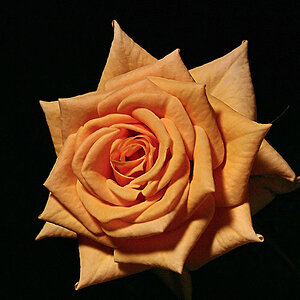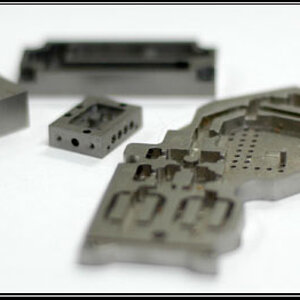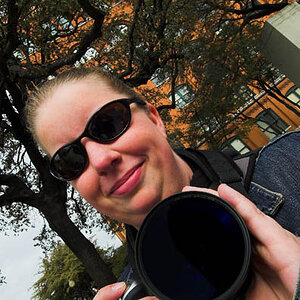As far as my experience goes, "I'd rather buy Canon"-attitude is not based on rational thinking. Again, according to my experience (can't say for sure as it would require quite heavy testing setups) and what I've read, some lenses in the Tamron SP range are chaper and have "better" or "equal" (this is partially subjective) image quality compared to the equivalent Canon L lens (specifically I have experience of Tamron 28-75/2.8 and Tamron 17-35/2.8-4.0). If you need for instance weather sealing (and have a weather sealed body), then Canon is your only choice. But as a friendly advice, when choosing which lens to buy, brand in it self is irrelevant. Consider the other factors of course, but don't look at the brand.Alex06 said:Also planning on getting the Canon 100mm 2.8 macro. Canons got a rebate going on now. I had been thinking about the Tamron 90mm 2.8 but I'd rather buy canon.
Navigation
Install the app
How to install the app on iOS
Follow along with the video below to see how to install our site as a web app on your home screen.

Note: This feature currently requires accessing the site using the built-in Safari browser.
More options
You are using an out of date browser. It may not display this or other websites correctly.
You should upgrade or use an alternative browser.
You should upgrade or use an alternative browser.
"L" series on 10D?
- Thread starter Alex06
- Start date
markc
TPF Noob!
- Joined
- Mar 8, 2004
- Messages
- 4,237
- Reaction score
- 6
- Location
- Rochester, NY Velocity: Unknown
- Website
- www.markcarpenter.com
- Can others edit my Photos
- Photos NOT OK to edit
When the digital bodies first started to come out, several of the off-brand lenses would not work with them and had to be sent back to the factory to be upgraded. All of the Canon lenses worked. I'd also be curious to see the tests that found some of the off-brand lenses to be better than the L lenses. There may be some out there, and I haven't looked in a while, but I haven't seen any objective test data that shows this yet. If there is one, I'd really like to know about it.
AFAIK, there has been no problems with Tamron lenses. But you're right, for instance some Sigma lenses don't work well on a 20D.markc said:When the digital bodies first started to come out, several of the off-brand lenses would not work with them and had to be sent back to the factory to be upgraded. All of the Canon lenses worked.
While both of my Tamrons seem to be very sharp (didn't have to ask for a second copy), there are reports on the net that Tamron has quality control issues. I don't know if they're better or worse than Canon in that aspect, but I guess that might be worse. In some cases, if it is not possible or burdensome to exchange the lens if the copy is bad, Canon might be a better choice if only considering the probabilty of getting a "good copy".
Anyway this QC issue is something that I forgot in my previous message. But since I don't have any specific statistics, I have no idea if the thought of one of the manufacturers having bad QC is based on anything real.
I couldn't find that comparison of Tamron 17-35 vs Canon 17-40 that found the Tamron sharper (to be more specific, I found no direct comparison between the lenses). There might have been other image quality aspects where the Canon was better, can't remember. Sorry for sounding so vaguemarkc said:I'd also be curious to see the tests that found some of the off-brand lenses to be better than the L lenses. There may be some out there, and I haven't looked in a while, but I haven't seen any objective test data that shows this yet. If there is one, I'd really like to know about it.
Oh, and by the way, the Canon 70-200/2.8 IS is a very nice lens
Digital Matt
alter ego: Analog Matt
- Joined
- Jan 30, 2004
- Messages
- 5,358
- Reaction score
- 73
- Location
- Santa Barbara, CA
- Website
- www.mattperko.com
- Can others edit my Photos
- Photos NOT OK to edit
kmb said:I couldn't find that comparison of Tamron 17-35 vs Canon 17-40 that found the Tamron sharper (to be more specific, I found no direct comparison between the lenses).
I found this pretty easily, with google: http://nododo.home.comcast.net/ultrawide/index.html
To me, all the scientific data in the world doesn't matter. The quality of a picture taken by a specific lens will be different for every person. Everyone has their own nit picks. Having said that, I read lots of reviews of both the Canon 17-40 L, and the Tamron 17-35 before my purchase, (Mostly on Fred Miranda's site), and based on those reviews, I bought the Tamron. I've been very pleased with it, and would highly recommend it. I don't know if it's "better" than the Canon alternative per se', but I think it's on par with it optically, the only difference being af speed and build.
markc
TPF Noob!
- Joined
- Mar 8, 2004
- Messages
- 4,237
- Reaction score
- 6
- Location
- Rochester, NY Velocity: Unknown
- Website
- www.markcarpenter.com
- Can others edit my Photos
- Photos NOT OK to edit
That doesn't work for me. Scientific data is an accurate way to measure the difference between lenses. Someone might very well prefer a soft focus, but then I don't want them reviewing the resolving power of a lens for me. Data on lines of resolution, color abberations, distortion levels, etc., all tell us why a lens looks the way it does. The data is mapable to how the image will look. It just requires understanding how. The trick is to not rely on just one aspect. One lens may have better resolving power than another, but if it has nasty color abberations, then a person may pick the softer lens. But if one lens beats another on paper in every aspect, I think it's going to produce a better image. Scientific data is a way of taking what we see and mapping it to numbers in an objective manner. It's up to us to decided which aspects are important to us.Digital Matt said:To me, all the scientific data in the world doesn't matter. The quality of a picture taken by a specific lens will be different for every person.
Digital Matt
alter ego: Analog Matt
- Joined
- Jan 30, 2004
- Messages
- 5,358
- Reaction score
- 73
- Location
- Santa Barbara, CA
- Website
- www.mattperko.com
- Can others edit my Photos
- Photos NOT OK to edit
I can look at all that scientific data, but if I don't see it in a print, then it's of little interest to me. I prefer to look at sample pictures and judge the sharpness and distortion for myself, rather than look at an obtuse chart with numbers and curves.
If that data is your thing, you can easily find MTF charts for each lens, and decide for yourself.
If that data is your thing, you can easily find MTF charts for each lens, and decide for yourself.
markc
TPF Noob!
- Joined
- Mar 8, 2004
- Messages
- 4,237
- Reaction score
- 6
- Location
- Rochester, NY Velocity: Unknown
- Website
- www.markcarpenter.com
- Can others edit my Photos
- Photos NOT OK to edit
I hear ya. Sometimes a difference in numbers doesn't show up to our eyes. I'd love to be able to compare images, but it's so rare to find a true comparison. They need to be taken on the same camera within seconds of each other under controlled conditions for me to find them worthwhile. Too many other factors come into play otherwise.Digital Matt said:I can look at all that scientific data, but if I don't see it in a print, then it's of little interest to me. I prefer to look at sample pictures and judge the sharpness and distortion for myself, rather than look at an obtuse chart with numbers and curves.
If that data is your thing, you can easily find MTF charts for each lens, and decide for yourself.
I didn't want to imply that anyone should use the numbers. I just wanted to point out that they weren't useless. Sometimes people put down that method when it's really just another method of observation.
That's what I was looking for, thanks. I'm a bit embarassed that I couldn't find it, and I consider myself knowledgeable in these things :S.Digital Matt said:I found this pretty easily, with google: http://nododo.home.comcast.net/ultrawide/index.html
If it was possible, I'd choose my lenses based on viewing full size pictures of exactly the same situation(s) and conditions and decide which picture I like the most, and choose the lens based on that (and on aspects that are not related to IQ). I wouldn't care what the data said. But since this is not possible, I guess reading the data might be an option.markc said:That doesn't work for me. Scientific data is an accurate way to measure the difference between lenses. Someone might very well prefer a soft focus, but then I don't want them reviewing the resolving power of a lens for me. Data on lines of resolution, color abberations, distortion levels, etc., all tell us why a lens looks the way it does. The data is mapable to how the image will look.
I myself have chosen the lenses reading lots and lots of reviews (user reviews from fredmiranda.com and "expert" reviews from dedicated review sites) and forum posts. I'm sure understanding how good a lens that way is is at least as hard as understanding it through data (some people really, really want to believe their equipment is the best and only choice since they've paid so much money for it, some are more interested in the color or stripes of their equipment than photography and so on).
Edit: oops, some of the points already were made while I wrote this message...
Digital Matt
alter ego: Analog Matt
- Joined
- Jan 30, 2004
- Messages
- 5,358
- Reaction score
- 73
- Location
- Santa Barbara, CA
- Website
- www.mattperko.com
- Can others edit my Photos
- Photos NOT OK to edit
markc said:I hear ya. Sometimes a difference in numbers doesn't show up to our eyes. I'd love to be able to compare images, but it's so rare to find a true comparison. They need to be taken on the same camera within seconds of each other under controlled conditions for me to find them worthwhile. Too many other factors come into play otherwise.
I agree that it's important to have a controlled test environment. Look at that comparison I linked to. It's not done by a scientist, or lens manufacturer or anything, but it does show some pretty remarkable results for the Tamron.
As far as reading the technical side of things, for anyone that is curious, here is a good guide for how to read an MTF chart.
http://www.luminous-landscape.com/tutorials/understanding-series/understanding-mtf.shtml
markc
TPF Noob!
- Joined
- Mar 8, 2004
- Messages
- 4,237
- Reaction score
- 6
- Location
- Rochester, NY Velocity: Unknown
- Website
- www.markcarpenter.com
- Can others edit my Photos
- Photos NOT OK to edit
Good point. This is probably the biggest issue I have with word-of-mouth: All too often I see people recommending equipment or methods just because that's what they bought or use. "I bought XYZ and it's great! You'll love it!" I really have to wonder how many other similar pieces they've used in order to do a true comparison. They may very well love it and it may be great for their use, but that doesn't make it a valid reason to pick it over another piece.kmb said:some people really, really want to believe their equipment is the best and only choice since they've paid so much money for it
I recently took the plunge and bought a new LCD to replace my fading CRT. Compared to the old one, the new one is amazing. It would be very easy for me to recommend it to someone who was asking about buying a new monitor, even though I haven't compared it side-by-side to to what's out there. I looked at the numbers and at the reviews and decided to go for it, and I'm really happy with it, but I'd still try to phrase it in a way that would suggest they look at it and not recommend it over others. It's a tricky mindset to keep.
markc
TPF Noob!
- Joined
- Mar 8, 2004
- Messages
- 4,237
- Reaction score
- 6
- Location
- Rochester, NY Velocity: Unknown
- Website
- www.markcarpenter.com
- Can others edit my Photos
- Photos NOT OK to edit
Both good links, Matt. I would prefer it if they had used a test target instead of books, but they still look like good comparisons. For that lens comparison, it looks like it's a case of deciding if the build and weatherproofing is worth the extra money for the Canon.
Similar threads
- Replies
- 3
- Views
- 85
- Replies
- 1
- Views
- 501
- Replies
- 11
- Views
- 947







![[No title]](/data/xfmg/thumbnail/32/32929-22e23acc63d6ecb25e5ee941be87121f.jpg?1619735758)


![[No title]](/data/xfmg/thumbnail/32/32926-ec27ecead8c80d803404500d8f888dbf.jpg?1619735754)
![[No title]](/data/xfmg/thumbnail/32/32930-09414fc020c2a60a456ff59a05c5ef8f.jpg?1619735759)
